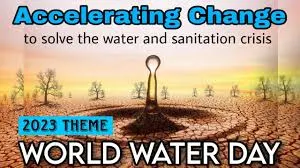By Ali Nawaz Rahimoo
World Water Day is an international observance held annually on March 22nd to raise awareness about the importance of water and the need to manage it sustainably. It was first proposed in 1992 at the United Nations Conference on Environment and Development in Rio de Janeiro, Brazil, and has been celebrated since 1993. The theme for World Water Day 2023 is "Valuing Water," which aims to highlight the social, economic, and environmental value of water and the need to recognize its worth in decision-making processes. The United Nations designated World Water Day as an opportunity to focus attention on the global water crisis and advocate for the sustainable management of freshwater resources.

It provides an opportunity for people, governments, and organizations around the world to take action to address water-related challenges such as water scarcity, pollution, and access to clean water and sanitation. Pakistan is indeed facing a water crisis, and the situation is getting worse day by day. According to the Pakistan Council of Research in Water Resources (PCRWR), the country is now approaching "absolute water scarcity," which is defined as less than 500 cubic meters of water per person per year. Pakistan is one of the most water-stressed countries in the world, with a rapidly growing population, increasing water demand, and limited water resources. The country's water availability per capita has decreased significantly over the years due to various factors such as climate change, poor water management practices, and the mismanagement of water resources. The situation is particularly severe in Pakistan's arid and semi-arid regions, where water availability is already low. The lack of water availability has led to a number of problems, including a decline in agricultural productivity, waterborne diseases, and social conflicts over water resources. The government of Pakistan has recognized the severity of the water crisis and has initiated several programs and policies to address the issue. These include measures to improve water management practices, increase water storage capacity, and promote the efficient use of water in agriculture and other sectors. However, much more needs to be done to mitigate the water crisis in Pakistan and ensure a sustainable water future for the country. Depleting groundwater resources are also the focus of this year’s World Water Day, being observed today. An outdated approach to water conservation and use, obsolete and water-intensive agricultural practices, and unchecked urbanization have contributed to Pakistan’s severe water crisis. Climate change has aggravated the situation as have the poor coping mechanisms of the federal and provincial water management bodies that remain ill-equipped and under-resourced. The fact that, in all these years, these bodies have failed to curb even the high transmission losses of 60pc of surface water speaks volumes for their inefficiency. These circumstances cost the national exchequer at least $12bn a year, with implications for food and economic security. The government must act fast by, first, realizing the gravity of the crisis and making the public aware of it. Secondly, alternatives must be found to water-intensive crops and farmers should be incentivized to accept the shift. Lastly, expert consultation is needed to upgrade and implement the National Water Policy immediately.









0 Comments